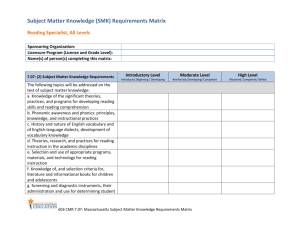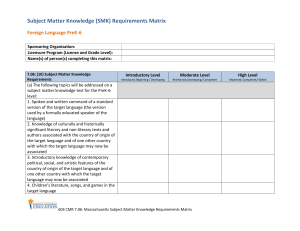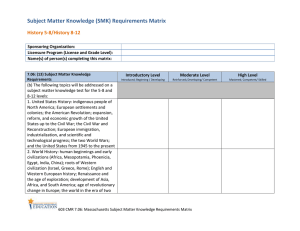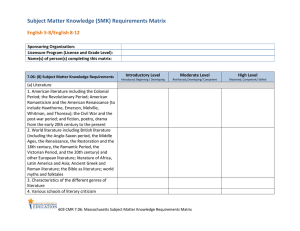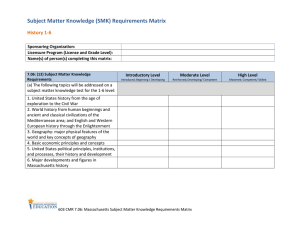VisuallyImpairedAllLevels
advertisement
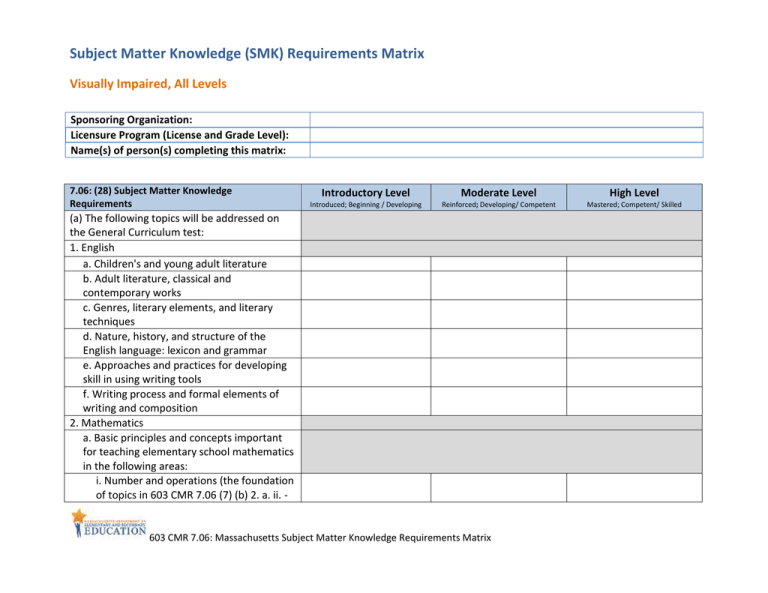
Subject Matter Knowledge (SMK) Requirements Matrix Visually Impaired, All Levels Sponsoring Organization: Licensure Program (License and Grade Level): Name(s) of person(s) completing this matrix: 7.06: (28) Subject Matter Knowledge Requirements Introductory Level Moderate Level High Level Introduced; Beginning / Developing Reinforced; Developing/ Competent Mastered; Competent/ Skilled (a) The following topics will be addressed on the General Curriculum test: 1. English a. Children's and young adult literature b. Adult literature, classical and contemporary works c. Genres, literary elements, and literary techniques d. Nature, history, and structure of the English language: lexicon and grammar e. Approaches and practices for developing skill in using writing tools f. Writing process and formal elements of writing and composition 2. Mathematics a. Basic principles and concepts important for teaching elementary school mathematics in the following areas: i. Number and operations (the foundation of topics in 603 CMR 7.06 (7) (b) 2. a. ii. - 603 CMR 7.06: Massachusetts Subject Matter Knowledge Requirements Matrix 7.06: (28) Subject Matter Knowledge Requirements Introductory Level Moderate Level High Level Introduced; Beginning / Developing Reinforced; Developing/ Competent Mastered; Competent/ Skilled iv.) ii. Functions and algebra iii. Geometry and measurement iv. Statistics and probability b. Candidates shall demonstrate that they possess both fundamental computation skills and comprehensive, in-depth understanding of K-8 mathematics. They must demonstrate not only that they know how to do elementary mathematics, but that they understand and can explain to students, in multiple ways, why it makes sense c. The Commissioner, in consultation with the Chancellor of Higher Education, shall issue guidelines for the scope and depth of knowledge expected in mathematics, described in 603 CMR 7.06 (7) (b) 2 a. and b. 3. History and Social Science a. Major developments and figures in Massachusetts and U.S. history from colonial times to the present b. Major developments and figures in world history, with stress on Western civilization c. Basic economic principles and concepts d. Basic geographical principles and concepts e. U.S. political principles, ideals, founding documents, institutions, and processes, their history and development E 603 CMR 7.06: Massachusetts Subject Matter Knowledge Requirements Matrix 7.06: (28) Subject Matter Knowledge Requirements Introductory Level Moderate Level High Level Introduced; Beginning / Developing Reinforced; Developing/ Competent Mastered; Competent/ Skilled 4. Science and Technology/Engineering a. Basic principles and concepts of the life sciences appropriate to the elementary school curriculum b. Basic principles and concepts of the physical sciences appropriate to the elementary school curriculum c. Principles and procedures of scientific inquiry d. History of major scientific and technological discoveries or inventions e. Safety issues related to science investigations (b) The following topics will be addressed on the Foundations of Reading test: 1. Reading theory, research, and practice a. Knowledge of the significant theories, practices, and programs for developing reading skills and reading comprehension b. Phonemic awareness and phonics: principles, knowledge, and instructional practices c. Diagnosis and assessment of reading skills using standardized, criterionreferenced, and informal assessment instruments 2. Development of a listening, speaking, and reading vocabulary. 3. Theories on the relationships between beginning writing and reading E 603 CMR 7.06: Massachusetts Subject Matter Knowledge Requirements Matrix 7.06: (28) Subject Matter Knowledge Requirements Introductory Level Moderate Level High Level Introduced; Beginning / Developing Reinforced; Developing/ Competent Mastered; Competent/ Skilled 4. Theories of first and second language acquisition and development (c) The following topics shall be included in an approved program but will not be addressed on a test of subject matter knowledge: 1. Similarities and differences between visually impaired and non-visually impaired children in emotional, social, physical, and intellectual development 2. Anatomy and physiology of the eye and visual abnormalities 3. Historical and current developments in education of the visually impaired in the United States and other countries 4. How to use state-of-the-art diagnostic information 5. Medical and educational research related to the visually impaired 6. Use of Grade II Braille and the Nemeth Code 7. Use of assistive technology such as lowvision devices 8. Design or modification of the curriculum and instructional materials for the visually impaired 9. Ways to prepare visually impaired students for, classrooms ranging from general education classrooms to schools for the visually impaired 10. Features of family support and services 11. Preparation, implementation, and E 603 CMR 7.06: Massachusetts Subject Matter Knowledge Requirements Matrix 7.06: (28) Subject Matter Knowledge Requirements Introductory Level Moderate Level High Level Introduced; Beginning / Developing Reinforced; Developing/ Competent Mastered; Competent/ Skilled evaluation of Individualized Education Programs (IEPs) 12. Federal and state laws pertaining to special education 13. Science laboratory work 14. Child development a. Basic theories of cognitive, social, emotional, language, and physical development from childhood through adolescence b. Characteristics and instructional implications of moderately and severely disabling conditions E 603 CMR 7.06: Massachusetts Subject Matter Knowledge Requirements Matrix
